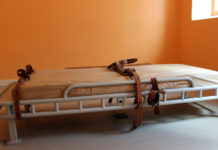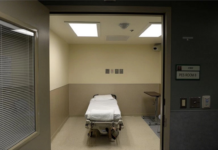MIA Survey: Ex-patients Tell of Force, Trauma and Sexual Abuse in America’s Mental Hospitals
In a MIA survey of people who had been patients in mental hospitals, nearly 500 respondents told of an experience that was often traumatic, and frequently characterized by a violation of their legal rights, forced treatment with drugs, and physical or sexual abuse. Only 17% said they were “satisfied” with the “quality of the psychiatric treatment” they received.
United Nations Report Calls for Revolution in Mental Health Care
In a new report, the United Nations Special Rapporteur on the right to health, Dr. Dainius Pūras, calls for a move away from the biomedical model and “excessive use of psychotropic medicines.”
Inhumane Medicine in Germany: A Dark Chapter Continued
Although I left Ueckermünde without the ability to speak, heavily traumatized and barely able to move, I managed to reclaim life after more than a decade. Today I am one of the few witnesses who survived the Hell of Ueckermünde, who can tell the story of my companions and raise awareness of the injustice committed against us as well as demand answers.
New Review Highlights Dangers of Electroconvulsive Therapy
Data shows that over a third of users experience permanent memory loss and that approximately half report not receiving adequate information about the risks from their doctors.
“Prisons Without Bars” – Forced Institutionalization of People with Disabilities
In the wake of deinstitutionalization, we no longer have the vast asylum system we once did. Instead, something more insidious has taken root — for-profit institutions that call themselves neurorehabilitation centers, group homes, and other official-sounding names.
The Orwellian New Digital Abilify Will Subjugate Vulnerable People Across the US
The FDA approved the prescribing and sale of a new hi-tech compliance-monitoring “antipsychotic” drug this week. A new chapter in human darkness has descended — one that is applauded by the alliance of control addicts that made it happen.
Forced Drugging with Antipsychotics is Against the Law: Decision in Norway
In all countries, we need to work for ensuring that forced medication for psychiatric patients is forbidden by law. Virtually all countries, apart from the US, have ratified the UN Convention on the Rights of Persons with Disabilities, which prohibits forced drugging, but not a single country has done anything.
What It’s Like to Be Involuntarily Committed
Ten years after being fired for taking a mental health leave after the Virginia Tech massacre, I was diagnosed as "schizophrenic" and involuntarily committed to a hospital. Now I have a job and a life, but I'm still forced to take drugs and report to a social worker.
Forced Psychiatry is Torture
I am a survivor of forced psychiatry, and I bring this perspective with me as a human rights lawyer. People with disabilities have a right to be as we are and not to have our bodies and minds made over to suit other people. We alone have the right to decide whether a medical treatment will support who we are or detract from who we are, and that is why free and informed consent is the essential requirement.
The Media’s New Hashtag: #GuardianshipIsGood for Britney Spears
Recent press coverage of top star Britney Spears, who remains under a personal and professional guardianship, reflects conventional attitudes about “mental illness” that are both stigmatizing and encourage legislation that promotes forced treatment.
Abolishing Forced Treatment in Psychiatry is an Ethical Imperative
Forced treatment in psychiatry cannot be defended, neither on ethical, legal or scientific grounds. It has never been shown that forced treatment does more good than harm, and it is highly likely that the opposite is true. We need to abolish our laws about this, in accordance with the United Nations Convention on the Rights of Persons with Disabilities, which virtually all countries have ratified.
Feral Psychiatry: The Case of Garth Daniels
Garth Daniels, a 39-year-old Melbourne man, has been shackled for 110 days and forced to undergo ECT 94 times at three times a week against his will. Last year, his family asked me to provide a second opinion on Garth’s case. As predicted, my recommendations against continued ECT were quickly dismissed by the hospital. There are critically important issues at stake in this case.
Risk of Suicide After Hospitalization Even Higher Than Previously Estimated
New analysis of post-discharge suicide rates finds estimates 6 times higher than recent studies.
Violence Caused by Antidepressants: An Update after Munich
The media is now reporting details about the 18-year-old who shot and killed nine and wounded many others before killing himself on July 22 in Munich. My clinical and forensic experience leads to a distinction among people who murder under the influence of psychiatric drugs. Those who kill only one or two people, or close family members, often have little or no history of mental disturbance and violent tendencies. The drug itself seems like the sole cause of the violent outburst. On the other hand, most of those who commit mass violence while taking psychiatric drugs often have a long history of mental disturbance and sometimes violence. For these people, the mental health system seems to have provoked increasing violence without recognizing the danger.
Safety Analysis Weighs Harms and Benefits of Antipsychotic Drugs
The researchers find that the drug effects for reducing psychosis are small and that treatment failure and severe side effects are common.
Dehumanization Linked to Poorer Mental and Physical Health
A new review finds that dehumanizing language, including self-dehumanization, is connected to anxiety, depression, and disordered eating.
DeJarnette Sanitarium
From Atlas Obscura: In the 1930s, hundreds of people with mental disabilities committed to the now abandoned DeJarnette Sanitarium were forcibly sterilized and experimented on by the hospital's eugenicist namesake.
The Torture in Treatment
In psychiatric hospitals we have set up the same environment as the Stanford Prison Experiment, but without a professor watching who has the authority to shut it down when things go horribly wrong. As a patient, there wasn’t any protection from the inescapable abuse of limitless power.
The ACE Survey is Unusable Data
Do the effects of trauma matter more, or a person's ACE score? I think this is unusable data that harms people when you gather it. Here's why.
Study Finds Improved Functioning for ‘Schizophrenia’ Without Antipsychotics
Long-term treatment with antipsychotic drugs is currently considered the standard treatment for patients diagnosed with ‘schizophrenia.’ A new study challenges this practice, however. The...
The Helping Room
Every culture has its share of individuals who break down in bewilderment. People who hallucinate, behave beyond norms, seek to die, think in strange ways.
‘CRAZY’: New Documentary about Forced Psychiatric Treatment
Lise Zumwalt’s new documentary “CRAZY” follows Eric, a young adult diagnosed with serious mental illness, and his father, who together want to change Eric’s treatment. However, the county does not want to give them a say.
When the Hospital is Sick
At my job as an inpatient mental health counselor, I had to confront the reality of a hospitalization system with serious and devastating flaws. I felt immensely powerless and understood how my coworkers could end up so negligent, numb, and at times abusive. And I understood how patients could become violent or self-injurious after years in these dismal hospitals.
Reflections on a Decade of Assertive Community Treatment
Sometimes I am crazy and sometimes I need help, but that help must not be forced upon me. I need to direct my own care; I need to be listened to. ACT is a method of social control that has more to do with saving money than assisting those in need. Money is saved by turning patients' homes into hospitals.
Committed: The Battle Over Involuntary Psychiatric Care
Dinah Miller and Annette Hanson are psychiatrists who blog at Shrink Rap. On one topic we agree — the subject of involuntary care is the most contentious and troubling topic for psychiatry. To their credit, they have directed an enormous amount of attention to this subject in their latest book.





























